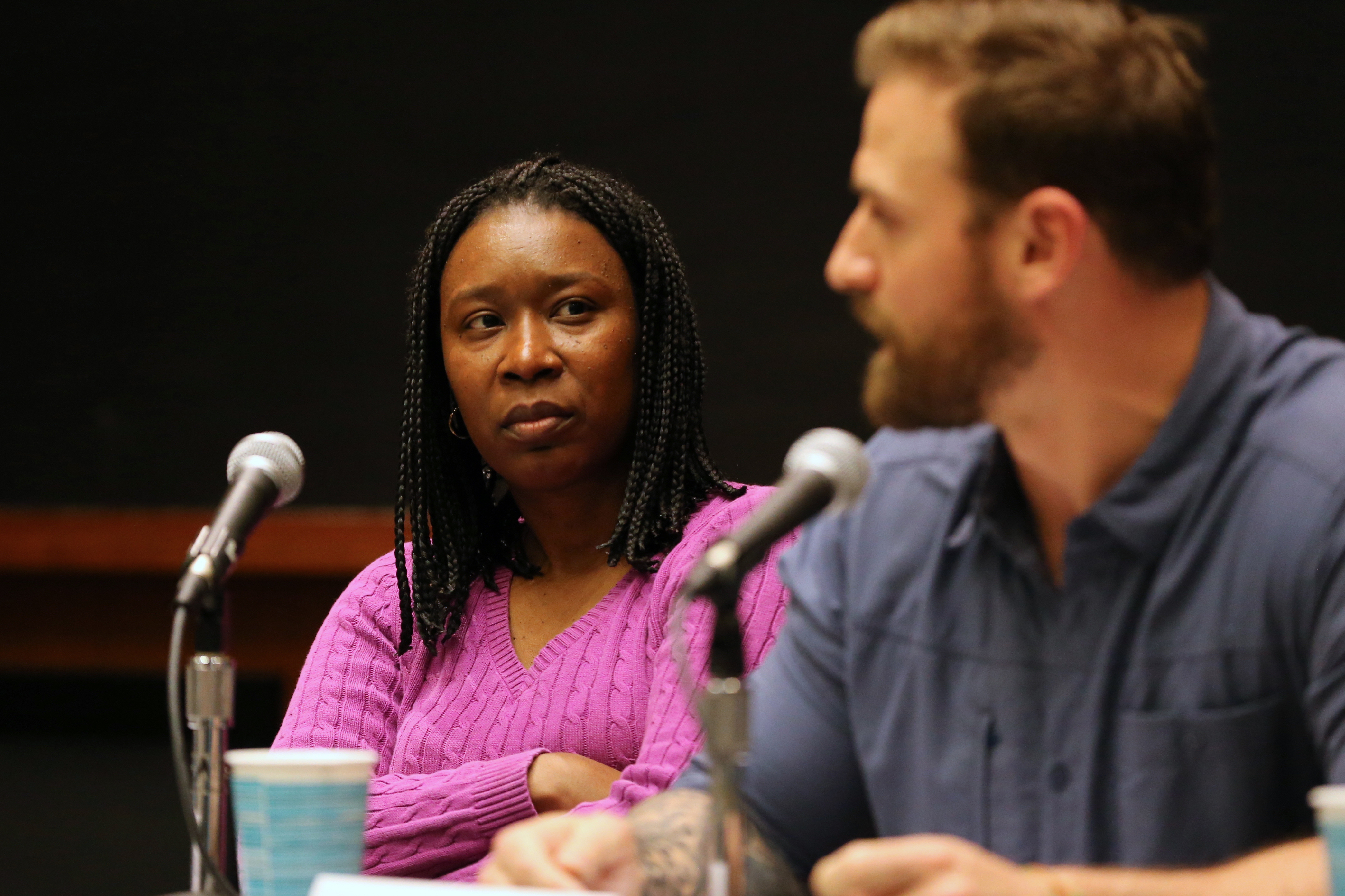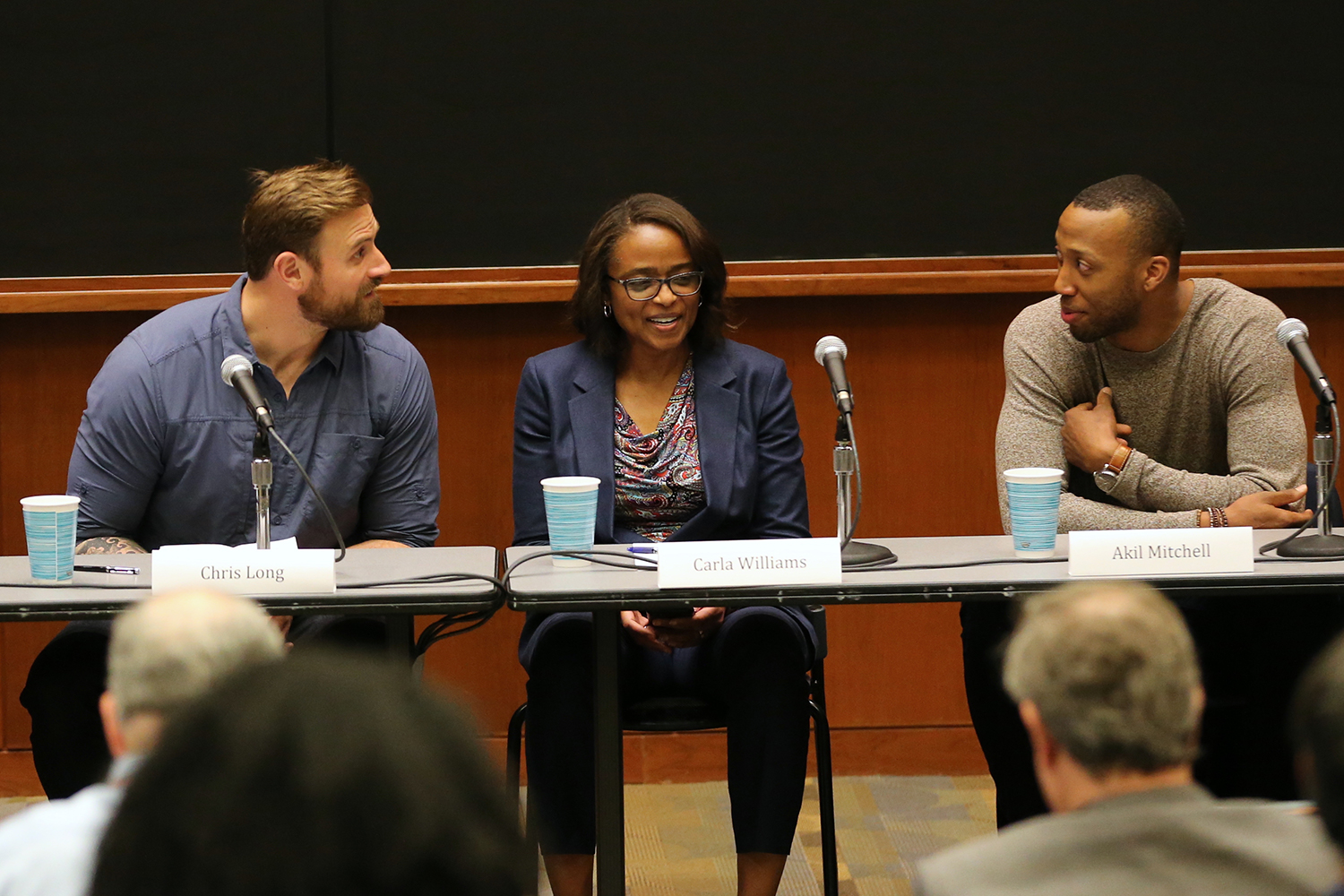Chris Long was 16 and on his way to his girlfriend’s house in Crozet when he got pulled over by a policeman.
Before the officer – who was black – could even approach, a carefree Long hopped out of his pick-up truck, climbed into the bed and began rummaging through a bag that contained his driver’s license.
Sixteen years later, the former University of Virginia football star and two-time Super Bowl champion just shakes his head as he recalls the episode – which ended with the policeman advising Long how to act if he was ever pulled over again in the future, then sending him on his way.
“Now I look at that through the lens of what’s going on around the country … that’s just an example of you grow up in the bubble you grow up in,” Long said.
What happens when those bubbles intersect was at the heart of a panel discussion entitled, “Athletics and Race,” which featured Long, UVA athletics director Carla Williams and former Cavalier basketball standout Akil Mitchell on Friday night at Nau Hall.
Just a few minutes before Long shared his story, Williams – who is African-American –talked about having to give her 13-year-old son a step-by-step lesson on what to do if he was ever pulled over by police. “Keep your hands on the steering wheel, don’t make any sudden moves, make sure you obey every order,” she said.
Williams added: “Those are very real conversations that we have to have.”
The 90-minute discussion, moderated by University of Virginia professor of African-American and African Studies and History Claudrena Harold, frequently delved into the events of Aug. 11 and 12 in Charlottesville.
Mitchell, a former student of Harold’s, said he wished he could say he was surprised by what happened.
“This country has had issues with race, continues to have issues with race,” he said.
Long, who grew up in Charlottesville, called the two days in August “the most embarrassing and horrifying” of his life. He said the incidents brought him to a place emotionally and mentally he had never been.
“I was disgusted,” he said. “I can never understand what it’s like to be black in America, but for that moment I was very upset – beyond just being a white guy who hates racism and that ugliness. It’s catapulted me into wanting to dive even further into fighting for social justice as a white dude from Charlottesville living in America.”
Long who has become known for his outspokenness on a wide range of issues, didn’t hold back on what he thought about Confederate statues in Charlottesville. He said the argument that they are a part of history doesn’t hold water.
“I don’t need a statue of a dinosaur by City Hall to realize that dinosaurs existed,” he said. “Don’t try and twist this. Everybody knows Hitler existed. There’s not a statue on Route 29.”
“Most people in Charlottesville don’t want to see those statues,” Long continued. “If you love them so much and you’re a rich guy that’s a Confederate romanticist – whatever that means – buy the statue and get it out of here and put it on your farm. That’s the way I look at it.”
Williams said she believes the best way to bring people from various walks of life together is through education.
“A lot of that darkness comes from ignorance and from people who just aren’t informed,” she said. “And so how do you counter ignorance and people who aren’t informed? It’s through education at a young age. That’s one of the things we try and promote in athletics – the importance of education, the value of education.”
Long said that the silver lining of the August events was people of different ethnicities, colors and creeds banding together for a common cause.
“Now, is it just a one-day thing or are we going to continue that?” Long said. “That’s the big question.”
Fourth-year UVA student-athlete Logan Carrington, a member of the track-and-field team, told the panel about challenges he faces in bringing fellow black students together and getting their message heard.
“Sometimes you need to go out of your immediate bubble,” Williams told him.
Mitchell shared a story from his first year at UVA in which he encountered racism and teammate Mustapha Farrakhan – the grandson of the Nation of Islam leader – told him to get used to it. “I remember thinking in that moment, ‘Oh man, I thought this would be a little different,’” Mitchell said.
Mitchell implored Carrington and other student-athletes in attendance to take advantage of the platforms they have.
“The only reason you guys care about what I have to say is because I play sports, right?” he said. “So sports gives us the opportunity and the platform to say things that if I was 6-2 and couldn’t dunk … you guys wouldn’t care.
“In that sense, sports are really important. Sports brings us together in a way that anything else can’t. People care about entertainment and will listen to a certain extent.”
Mitchell, though, said talking is just the jumping-off point.
“It’s way more important to do things,” he told the audience. “Reach out and get to know Charlottesville as a town. Get to know the people. Get to know the townies – as we like to call them. Those are us, those are our people. If we fall into this pattern where everything is just the way it is, nothing will ever change.”
Shortly after the events of last August, Long, during a preseason NFL game, placed his arm on the back of Philadelphia Eagles teammate Malcolm Jenkins, who had raised his fist in protest of racial injustice.
Long said given the landscape in which some players – most notably quarterback Colin Kaepernick – have had trouble landing jobs because of their frankness, the gesture was a risk.
But those are the types of risks he’s been taking for several years now.
“I am personally not afraid to lose my job,” Long said. “I would always just rather be me than be a fake version of me and have a job. And I’m lucky that I’ve been paid a lot of money to do what I love and this stuff has kind of come when I’m in a comfortable position, but I’d like to think if I was a rookie I’d do the same thing.”
Mitchell said when he was with the Brooklyn Nets this past season an idea by some members of the team to wear T-shirts expressing their viewpoint was nixed by other members of the team, who were concerned about drawing media attention.
“If I make someone mad, there’s a hungry guy waiting to take my spot,” Mitchell said. “In conversations I have with other players, that’s always the first thing that comes up. Guys are afraid of the repercussions.”
Then there are fans and other members of the public who believe athletes should “just dribble” – something that drives Long nuts. Recently, he went on a Twitter diatribe after one person told him he should stick to sports.
“If everybody stuck to what they did, nobody could talk about real issues,” Long said. “If we’re role models, we’re going to tackle real issues. We don’t just do turkey drives. How can you get mad at me when I’m trying to look out for the welfare of my community?”
Long added: “I’m not here to unite America. I’m here to speak what I think is the truth. Sometimes, ‘Stop being divisive’ is just code for, ‘I don’t want to hear what you’re saying.’”

Professor of African-American and African Studies and History Claudrena Harold, left, moderated the discussion. (Photo by Jim Daves, University Athletics)
Harold said one of her proudest moments was when one of her former students, LaRoy Reynolds, a former football player, gave a speech for a Black Student Alliance event. Afterward, Harold said Reynolds told her that it was the first time he felt like a real part of the university.
“As a professor and as administrators, that’s what we’re trying to create,” said Harold, peering out at the student-athletes in attendance. “I think and I hope and I will pray that there are certain things that you will get in these classes – get into conversations in dorms with your fellow students that will push you and prepare you in a certain kind of way.”
Harold said athletes at all levels are making more of an impact than they can sometimes even recognize. She believes a generation of kids are taking their cues from athletes such as Long and Mitchell.
“It’s going be … revolutionary,” she said.
Media Contact
Article Information
April 29, 2018
/content/akil-mitchell-and-chris-long-return-grounds-discuss-race-and-athletics

